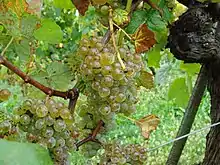
Hondarrabi Zuri is a white variety of Vitis vinifera (Grape) that is native of the Basque Country, Spain.
The bunches are small and compact and the berries small, round and golden in colour. The must produces a pale yellow wine, with aromas of citrus fruit, ripe fruit, herbs and flowers. It is the main grape used to make Txakoli wine.
Hondarrabi Zuri
Hondarrabi Zuri is a synonym for any of three grape varieties of Vitis vinifera found in South West France and Basque, an autonomous region of Spain, including:
Characteristic
Until the 19th century there were many hectares of hondarrabi zuri in the region. The aristocrat Wilhelm von Humboldt came to compare his wines with the most prestigious of Alsace and the Rhineland. It is not a very productive vine, so it is not he managed to recover the previous number of hectares. It rarely exceeds 8,000 kg/ha or 60 hl/ha.[2]
Some Basque producers blend Hondarrabi Zuri with the red Hondarrabi Beltza variety or with small amounts of Petit Corbu and Gros Manseng, to create wines with more aromatic complexity.[3]
Hondarrabi zuri vines produce grapes and bunches of small size. The wines have intense aromas of pear and exotic fruits, as well as citrus, herbaceous and floral nuances, with notable acidity and a medium to moderate alcohol content. In good vintages, when the maturation circumstances are optimal, it is possible to obtain aromatic, powerful and very balanced wines. The quality of the chacolíes that are produced with hondarribi zuri has nothing to do with that of others that are produced in the area with unsuitable varieties and incorrect production techniques, which produce wines that are not very aromatic, excessively acidic, light and often with a significant amount of dissolved carbon dioxide.[2]
Regions
In a subregion of Basque, called Txakoli, Hondarrabi Zuri is a synonym for both Courbu Blanc and Crouchen.[4] Hondarrabi Zuri is the predominant grape variety used in Txakoli's white wines. In Txakoli, Hondarrabi Zuri can be found with three different spellings: Hondarrabi Zuri,[4] Hondarribi Zuri[5] and Ondaria Zuria.
Hondarrabi Zuri, is grown in the following Denominaciones de Origen (DOs):
Synonyms
This variety is known by synonyms such as ondarrabi zuri, ondarabiya zuriya, ondarrabi txuri, ondarrubi zurilla, oudanabi, tocuri, txuri, zuri and zuria. Likewise, hondarrabi zuri is a synonym of the French courbu blanc grape.[6]
References
- ↑ Anderson, Kym (May 2013). "JANCIS ROBINSON, JULIA HARDING and JOSÉ VOUILLAMOZ: Wine Grapes: A Complete Guide to 1,368 Vine Varieties, including their Origins and Flavours. Ecco (Harper Collins), New York, October 2012, xxxvii + 1242 pp., ISBN 978-0062206367 (hardback), US$175". Journal of Wine Economics. 8 (1): 106–109. doi:10.1017/jwe.2013.9. ISSN 1931-4361. S2CID 162859303.
- 1 2 José Hidalgo Togores (2010). Tratado de enología. Mundi Prensa. p. 830. ISBN 978-84-8476-416-8.
- ↑ Carlos Delgado (25 June 2011). "De chacolí a blanco". El País.
- 1 2 Illustrated descriptive catalogue of fruit trees, small fruits, grape-vines, escultent roots, ornamental trees, shrubs, vines, etc. cultivated and for sale /. Monroe, Mich.: I.E. Ilgenfritz & Sons. 1893. doi:10.5962/bhl.title.85993.
- ↑ Anderson, Kym (May 2013). "JANCIS ROBINSON, JULIA HARDING and JOSÉ VOUILLAMOZ: Wine Grapes: A Complete Guide to 1,368 Vine Varieties, including their Origins and Flavours. Ecco (Harper Collins), New York, October 2012, xxxvii + 1242 pp., ISBN 978-0062206367 (hardback), US$175". Journal of Wine Economics. 8 (1): 106–109. doi:10.1017/jwe.2013.9. ISSN 1931-4361. S2CID 162859303.
- ↑ Ganesch, Julius Kühn-Institut (JKI), Federal Research Centre for Cultivated Plants, Institute for Grapevine Breeding, Geilweilerhof ,Siebeldingen, Erika Maul, Reinhard Töpfer, Alina. "VIVC". www.vivc.de. Retrieved 2022-05-17.
{{cite web}}: CS1 maint: multiple names: authors list (link)